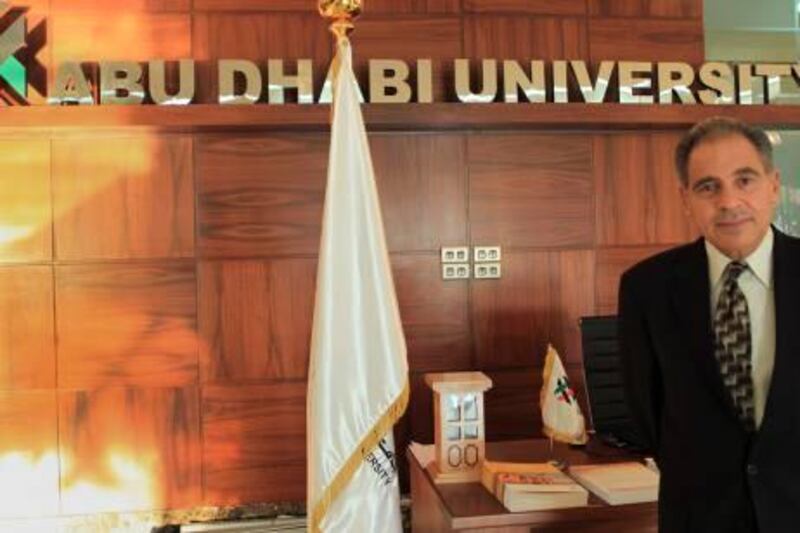Academics are calling for counselling in schools to help pupils to make the transition to university.
Nabil Ibrahim, the chancellor of Abu Dhabi University, said his institution was in discussions with about 10 schools in the capital, private and public, to pilot a system of working with pupils in Grade 9 or 10.
He said early intervention and career guidance would address many issues that hamper universities, including high dropout rates and the need for foundation courses.
"It may take a year or so to implement, but from my experience in the US it's the most effective process in terms of student retention," Mr Ibrahim said.
The system ensures that around 90 per cent of students complete their studies, he said.
"In grade 10 you start recruiting students, and by 11 and 12 you get them to really prepare themselves for a career and for college life, to be independent, to make decisions, manage time," Mr Ibrahim said.
"There's a lot of hand-holding in high school that you don't have in college."
At Zayed University alone, around 18 per cent of students drop out in the first year, unable to meet the demands of university life or tempted by careers in the army or police.
At other colleges the number of students who do not complete their studies is believed to be up to 50 per cent.
Only about 10 per cent of students are able to begin their undergraduate studies at the Higher Colleges of Technology immediately after leaving school. The rest create a burden on the university, which must bring them up to standard with a remedial education foundation programme of at least a year.
The number of students qualifying for direct entry to Zayed University increased this year from 16 per cent to 30 per cent, but a large number must still go through the academic bridge programme, especially in English, the language of tuition. The Minister of Higher Education and Scientific Research, Sheikh Nahyan bin Mubarak Al Nahyan, calls these remedial programmes an "issue that has plagued our educational system for decades".
Rory Hume, the provost at UAE University, said qualified career counsellors would help to eliminate the need for such programmes. "Universities need to play a role as well, by communicating clearly with counsellors to let them, and therefore the students they advise, know what our admissions requirements are for different universities and different programmes," he said.
Mr Hume said that at least one career counsellor in every high school would also encourage more boys to go on to higher education, rather than taking the apparently easier and more lucrative option of a career in the army or police.
Tom Alibrandi, director of the academic bridge programme at the American University of Sharjah, says the issue of counselling "strikes at the heart of university retention problems". He said: "That lack of understanding of what it takes to be a student, along with inadequate preparation in English, are two of the major issues students face when they come to AUS, and we get top students whose average GPA is over 92 per cent."
Bryan Gilroy, assistant provost at Zayed's Office of Enrolment Management, said intervention must come earlier: "The three state tertiary institutions do visit the high schools each year to talk about how to apply for a place at Zayed University, the Higher Colleges of Technology and UAEU, but these visits usually focus on grade 12, the final high school year.
"This year, however, Zayed University is also trying to develop closer contacts with schools and students in grades 10 to 12. The need to reach these students is something that we are very aware of. If everything is left to grade 12 it is simply too late."
Mary Corrado, UAE director of America-Mideast, a nonprofit organisation that helps students around the world to travel to the US for study, said: "I see here that many students wait until they graduate from high school and then start looking into how to apply to colleges and universities. This number, however, is getting smaller, so there seems to be a growing awareness of the time needed to complete applications." She said there was a difference between private and government schools, where little or no career counselling took place.
Tim Carnley, from Education UK at the British Council, said one problem was a lack of expertise. "There isn't exactly an abundant pool of counsellors to draw from here," he said.
The Sharjah Higher Colleges of Technology launched a diploma programme in 2004 in career advising and career counselling, to train a new pool of school counsellors, but owing to a lack of funding in the education system only a handful of the 90 graduates are now in schools. They are employed in jobs such as human resources.
The colleges' director, Farid Ohan, said: "When the students reach us in their foundation year, we end up spending quite a lot of time doing what one would have hoped would have been done in high school so that by the time they finish, they'd have a good sense of what career they want to pursue and what suits their skills and has good job prospects and where their strengths lie. Much more needs to be done than is being done now."






